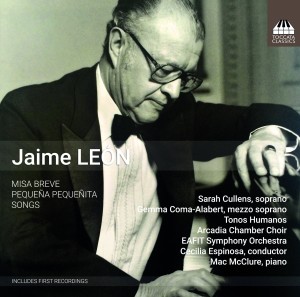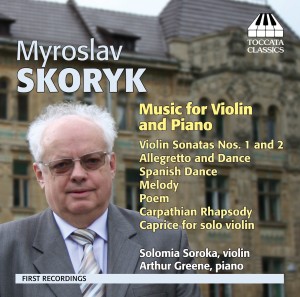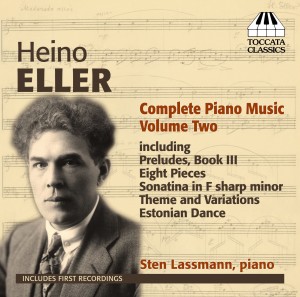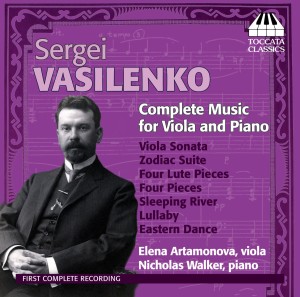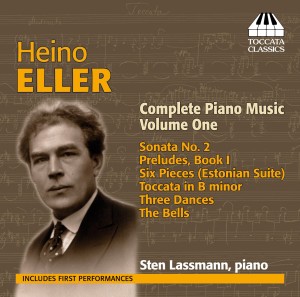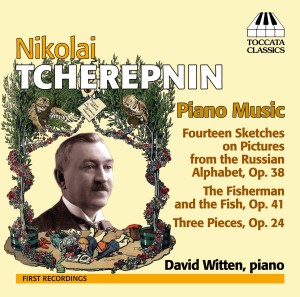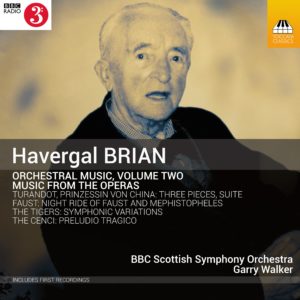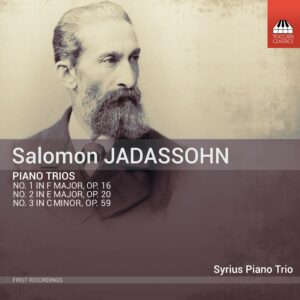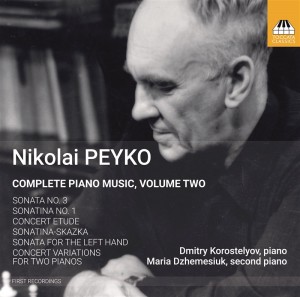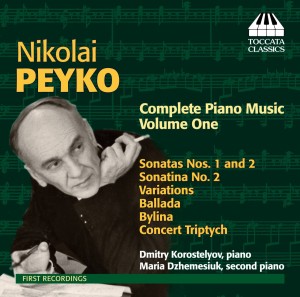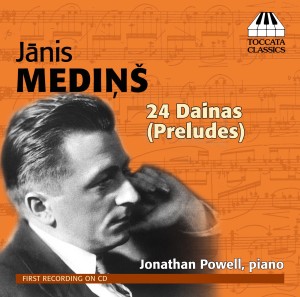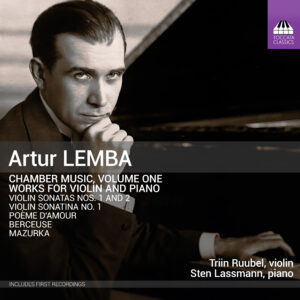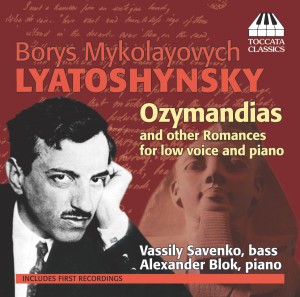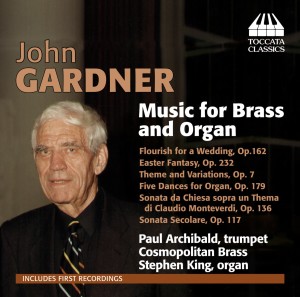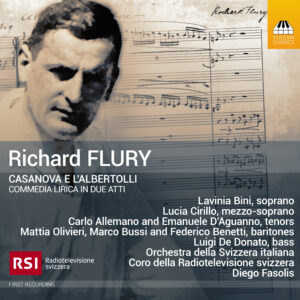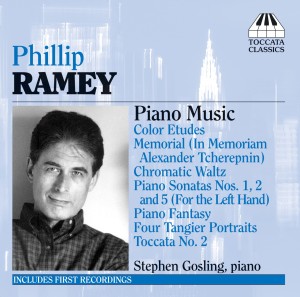Search Results for "obras de william makepeace thackeray" – Page 7
Showing results for operas william magpies teacher
Jaime León: Vocal Music
Born in 1921, Jaime León is now the Grand Old Man of Colombian music. A vital figure in the development of Colombian art-music, León has been pianist (he is a grand-student of Clara Schumann), conductor, teacher, administrator and composer. His Misa breve has an innocent sincerity reminiscent of Poulenc's religious music, and although the word-setting in his songs is subtle and imaginative, they have the same melodic immediacy and uncomplicated appeal.
Sarah Cullens, soprano; Gemma Coma-Alabert, mezzo soprano; Tonos Humanos; Arcadia Chamber Choir; EAFIT Symphony Orchestra; Cecilia Espinosa, conductor; Mac McClure, piano
Myroslav Skoryk: Music for Violin and Piano
The leading Ukrainian composer of today, Myroslav Skoryk (born in Lwów, now Lviv, in 1938) grew up in Siberia, where his family was deported after the Second World War, and he began to write music under the tutelage of other political prisoners there. He later studied with Kabalevsky in Moscow before settling back in his native city, where he soon became an important teacher and is now a major figure in Ukrainian cultural life. His music is direct and forthright, with echoes of Prokofiev: there are passages of driving energy and power and a keen sense of drama — and Skoryk, too, is not afraid of writing a glorious tune when he wants to.
Solomia Soroka, violin
Arthur Greene, piano
Heino Eller: Complete Piano Music, Volume Two
As both composer and teacher Heino Eller (1887-1970) was one of the founders of the classical tradition in his native Estonia. Yet his copious output for piano — some 200 works —is largely unknown, an omission this series of seven CDs seeks to redress. Volume Two presents compositions from six decades: charming romantic miniatures, virtuoso showpieces, expressionist preludes and quirky folk-pieces. The main item is his Theme and Variations from 1939 — one of his best works for piano, but not published or recorded before now.
Sten Lassmann, piano
Sergei Vasilenko: Complete Music for Viola and Piano
The Russian composer Sergei Vasilenko (1872-1956) was influenced by the nineteenth-century nationalist school, by his teacher Taneyev and by Scriabin, adding an interest in Symbolism and hints of early modernism. The discovery of the seven viola compositions on this CD — most of them unknown before now — not only expands the repertoire of the instrument; it also points to the courage of a composer who spent his life treading the tight-rope between his own musical interests and the demands of Soviet 'socialist realism'.
Elena Artamonova, viola
Nicholas Walker, piano
Heino Eller: Complete Piano Music, Volume One
The Estonian Heino Eller (1887-1970) is probably best known as the teacher of Arvo Pärt — but he was a prolific and original composer in his own right. His substantial output for piano — this series will contain seven CDs — was written over a period of six decades and thus reflects a range of styles. Taking the lyricism of Chopin and Grieg as its starting point, it combines the influence of Estonian folksong, Scriabin's troubled harmonies, the epic northern colouring of Sibelius and, at times, Prokofiev's motoric energy into an attractively individual manner.
Sten Lassmann, piano
Nikolai Tcherepnin: Piano Music
Nikolai Tcherepnin (1873-1945) — a student of Rimsky-Korsakov and teacher of Prokofiev — was a Russian-born composer and conductor, and the first of his family's musical dynasty. His piano music reveals a diversity of influences: the Three Pieces (c. 1890) have echoes of Chopin and Rachmaninov; the Fourteen Sketches on Pictures from the Russian Alphabet (1908) are miniature tone-poems inspired by Alexander Benois' beautifully illustrated alphabet book for children; and The Fisherman and the Fish (c. 1914) is a vivid musical depiction of this Pushkin poem, complete with watery splashes!
David Witten, piano
Havergal Brian: Orchestral Music, Volume Two
The English composer Havergal Brian (1876-1972) is renowned for his 32 symphonies, 21 of them — written after his 80th birthday — constituting one of the most remarkable Indian summers in the history of music. It is less well known that Brian also composed five operas; since none of them has yet been staged, this CD reveals for the first time some of the remarkably inventive and powerful orchestral pieces hidden within those scores.
BBC Scottish Symphony Orchestra, orchestra
Garry Walker, conductor
Salomon Jadassohn: Piano Trios Nos. 1-3
Salomon Jadassohn (1831-1902) is best remembered as a much-revered teacher at the Leipzig Conservatoire: his students included Busoni, Delius and Grieg; he himself studied with Liszt. Jadassohn's own compositions, roundly forgotten for a hundred years, are only now beginning to attract attention. As these three trios demonstrate, they are central to the German Romantic tradition, with something of Schumann's melodic inspiration, the spontaneity of Schubert and Mendelssohn's classicising elegance — fused together with Jadassohn's own impeccable craftsmanship.
Syrius Trio, piano trio
Elizabeth Cooney, violin
Jane Cords-O’Hara, cello
Bobby Chen, piano
Nikolai Peyko: Complete Piano Music, Volume Two
The Russian composer Nikolai Peyko (1916-95) studied with Myaskovsky at the Moscow Conservatoire, where he later became Shostakovich's teaching assistant and then an important teacher in his own right. Peyko's piano music shares Shostakovich's fondness for irony and Prokofiev's for driving march-rhythms and playful good humour. Each of the two CDs in this complete recording of his piano music ends with one of Peyko's two works for two pianos, in this instance the wildly exciting Concert Variations — the first time that any of this music has been heard in its entirety.
Dmitry Korostelyov, piano; Maria Dzhemesiuk, second piano;
Nikolai Peyko: Complete Piano Music, Volume One
The Russian composer Nikolai Peyko (1916-95) studied with Myaskovsky at the Moscow Conservatoire, where he later became Shostakovich's teaching assistant and then an important teacher in his own right. Peyko's piano music shares Shostakovich's fondness for irony and Prokofiev's for driving march-rhythms and playful good humour and, as with so many Russian composers, the sound of bells can often be heard. Each of the two CDs in this complete recording of his piano music ends with one of Peyko's two works for two pianos — the first time that any of this music has been heard in its entirety.
Dmitry Korostelyov, piano
Maria Dzhemesiuk, piano
Jānis Mediņš: 24 Dainas (Preludes)
Jānis Mediņš (1890-1966) was one of the pioneers of Latvian music: his works include the first Latvian opera, and he was also an important conductor and teacher. His 24 Dainas for piano — he took the title from Latvian folk-poetry — show the influence of Rachmaninov, Grieg and Scriabin and have a modal colour inherited from Latvian folk-music. Although their composition was spread over four decades — interrupted by the Second World War and Mediņš's exile in Sweden — the Dainas are unified by their passionate lyricism and epic sweep.
Jonathan Powell, piano
Artur Lemba: Chamber Music, Volume One
The music of Artur Lemba has been strangely neglected, even in his native Estonia – although during his lifetime (1885–1963) he was held in high regard as pianist and teacher. That oversight is all the more surprising in view of the expansive, passionate lyricism of his writing – listeners who enjoy the music of Tchaikovsky and Rachmaninov are likely to find Lemba’s appealing. This first release in a pioneering series discovering his chamber music is accompanied by two historical recordings, one with the composer himself at the piano, and the other, a century old, of the one Lemba miniature to achieve some degree of popularity.
Triin Ruubel, violin
Sten Lassman, piano
Boris Mykolayovych Lyatoshynsky: Romances for Low Voice and Piano
The Ukrainian composer Boris Lyatoshynsky (1895–1968) studied with Glière at the Kiev Conservatory, where he remained as a much-loved teacher for the rest of his life. Lyatoshynsky’s songs – a neglected part of his output – meld intense Scriabinesque expressionism with elements of Ukrainian folksong in a language that embraces both the lyrical and the dramatic. His setting of Shelley’s Ozymandias, with its warning of the impermanence of power, was a brave act in the Soviet Union of 1924.
Vassily Savenko, bass-baritone
Alexander Blok, piano
John Gardner: Music for Brass and Organ
The British composer John Gardner (b. 1917) has been astonishingly prolific, writing 249 opus numbers in his sixty-year career as composer, conductor and teacher. His music – basically tonal and always impeccably crafted – is characterised by charm, grace and humour. Gardner’s musical fingerprints come from his love of jazz, Renaissance and Baroque procedures and his mastery of imitative counterpoint. He generally uses established musical forms but invests them with a quirky and distinctive harmonic idiom. This CD explores his rich output for brass and organ, from the elegant Theme and Variations, Op. 7, of 1951 to the lusty Five Dances for Organ, Op. 179, written in 1988.
Paul Archibald, trumpet
Cosmopolitan Brass
Stephen King, organ
Richard Flury: Casanova e l’Albertolli, Commedia Lirica in Due Atti
Two traditions coalesce in Casanova e l’Albertolli (1937), the third of the four operas by the Swiss late-Romantic composer Richard Flury (1896–1967): Italian bel canto and the Swiss Festspiel – high art and popular culture. Styled a ‘Commedia lirica’, it invests the comic intrigue onstage with sweeping melodies of Puccinian richness, combining them with choruses based on Ticino folksong – it even has a yodelling chorus – in an engaging hybrid that deserves to be far better known. At the end, of course, evil is banished and love rewarded, but the entire score is dappled with happy inspirations that will bring a smile to the listener’s lips.
Carlo Allemano, tenor
Lavinia Bini, soprano
Mattia Olivieri, baritone
Marco Bussi, baritone
Lucia Cirillo, mezzo-soprano
Luigi De Donato, basso buffo
Federico Benetti, baritone
Emanuele D’Aguanno, tenor
Coro della Radiotelevisione Svizzera
Orchestra della Svizzera Italiana
Diego Fasolis, conductor
Phillip Ramey: Piano Music, Volume One, 1961–2003
The piano music of American composer Phillip Ramey (b. 1939) has its roots in the motoric athleticism of Prokofiev and Bartók, refracted through the wiry and elegant polyphony of his teacher, Alexander Tcherepnin. To these early influences Ramey has brought the tangy dissonance of mainstream modernism and a Lisztian enjoyment of the grand Romantic gesture. The works on this CD range in mood from tranquil introspection by way of sober lyricism to thunderous explosions of demonic energy expressed in high-octane piano-writing that pushes virtuosity to the limit.
Stephen Gosling, piano
Stay In the Know
JOIN THE TOCCATA NEWSLETTER
"*" indicates required fields
By visiting our site, you agree to our privacy policy regarding cookies, tracking statistics, etc.
